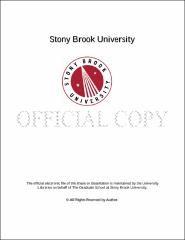| dc.identifier.uri | http://hdl.handle.net/11401/76770 | |
| dc.description.sponsorship | This work is sponsored by the Stony Brook University Graduate School in compliance with the requirements for completion of degree. | en_US |
| dc.format | Monograph | |
| dc.format.medium | Electronic Resource | en_US |
| dc.language.iso | en_US | |
| dc.publisher | The Graduate School, Stony Brook University: Stony Brook, NY. | |
| dc.type | Dissertation | |
| dcterms.abstract | This dissertation examines ways the environment conditions individual incentives to participate in collective action. I hypothesize that as resources become scarce, individuals are more willing to participate in individually-costly collective action, including intragroup cooperation and intergroup hostility. The first and second of three studies establish a unit-of-selection based, game-theoretic foundation for intergroup conflict. The final study explores macro-level implications for the relationship between climate change and violence in Africa. For human beings and other highly social creatures, cooperation is the key adaptation with which we respond to environmental challenges. Faced with resource scarcity, group living becomes increasingly vital for individual survival. The logic of markets dictates that demand benefits of group living increase, so does the price. Hence, groups may demand greater contributions from individuals, which enhances the strength and cohesion of the group, enabling it to take on more ambitious collective action efforts. Changing ecological circumstances should result in shifting selective pressures on individuals, disposing them to pursue alternative social strategies. Accordingly, we should observe indirect effects on patterns of intergroup-level. If true, this dissertation could have implications for social responses to global climate change. I test this hypothesis using climate and event data from Africa 1989-2006. In order to overcome methodological problems challenging previous studies, I use a disaggregated, time-series data structure better suited to dynamic analysis. | |
| dcterms.available | 2017-09-20T16:51:09Z | |
| dcterms.contributor | Smirnov, Oleg | en_US |
| dcterms.contributor | Taber, Charles | en_US |
| dcterms.contributor | Kline, Reuben | en_US |
| dcterms.contributor | Hannagan, Rebecca. | en_US |
| dcterms.creator | Seltzer, Nicholas A. | |
| dcterms.dateAccepted | 2017-09-20T16:51:09Z | |
| dcterms.dateSubmitted | 2017-09-20T16:51:09Z | |
| dcterms.description | Department of Political Science. | en_US |
| dcterms.extent | 229 pg. | en_US |
| dcterms.format | Application/PDF | en_US |
| dcterms.format | Monograph | |
| dcterms.identifier | http://hdl.handle.net/11401/76770 | |
| dcterms.issued | 2014-12-01 | |
| dcterms.language | en_US | |
| dcterms.provenance | Made available in DSpace on 2017-09-20T16:51:09Z (GMT). No. of bitstreams: 1
Seltzer_grad.sunysb_0771E_12011.pdf: 4736134 bytes, checksum: de519cbb9dc216d18a9542af1f9a8d37 (MD5)
Previous issue date: 1 | en |
| dcterms.publisher | The Graduate School, Stony Brook University: Stony Brook, NY. | |
| dcterms.subject | Climate Change, Conflict, Cooperation, Evolution, Violence | |
| dcterms.subject | Political Science | |
| dcterms.title | Conflict and Cooperation as Social Responses to Ecological Change | |
| dcterms.type | Dissertation | |

